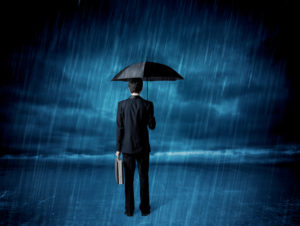What You Need to Know About Event Insurance

No matter how well you plan an event, things can always go wrong. A delegate may take a bad fall. Your AV equipment may get damaged by a leak. Or bad weather may force you to cancel the event altogether. In fact, preparing your events for all kinds of eventualities, especially around things like accidents, terrorism and national disasters has never been so important.
Event insurance helps organisers protect their events against unexpected situations which would otherwise leave them subject to hefty costs, potential lawsuits and loss of business. In fact, planning for event insurance is something that should be at the top of an organiser’s to-do list as leaving it late may mean not finding the cover you need.
Related read: Insurance for Hybrid Events – What You Need to Know
We spoke to Tracey Weatherill-Podbury from Event Insurance Services, one of the industry’s leading insurance providers, to find out what kind of things organisers need to think about when planning event insurance and what questions they need to be asking providers to get the most out of their policies. Have a look at what she had to say:
What type of insurance do you need for organising an event?
At Event Insurance Services, Public Liability Insurance is one of our most frequently purchased policies, and is important whether you are applying for anything from exhibition insurance to craft fair insurance. It is there to provide cover for instances that are unexpected and unforeseen. So it can offer cover for accidental bodily injury or third-party property damage or loss caused by the insured negligence.
Public liability can be taken out for main event organisers and third parties like exhibitors, stallholders, performers and food sellers. Normally, your insurance will not cover sub-contractors, so make sure you check that these third parties are insured. If it turns out they don’t have insurance and an incident occurs, this may result in you being liable!
Hosting an outdoor event? What happens if there is torrential rain and flooding that makes the venue unusable? You don’t want to lose out on all outgoing costs that you are unable to claim back. Again, this is where insurance can help. Cancellation cover, especially adverse weather cover, has over the years become increasingly popular due to the unpredictable UK weather.
Read: 10 essential tips to reduce event risk
What kind of questions should you be asking your insurance provider?
It’s always good to find out from the event venue or local council what cover they require you to have before you approach your insurance provider. This can save you a lot of time going backwards and forwards between the two providers. There’s nothing worse than being asked what amount of public liability you need and you not knowing the answer!
When you are searching for the best insurance provider you want to ensure that the policy you are taking out is completely transparent. If you have certain concerns for your event, make sure you are making the insurance provider aware of these concerns in case they have clauses that don’t offer the cover you really want.
Ask what additional covers your insurance provider offers. They may make you aware of a cover that you may not know about that could be something you realise you need.
What kind of costs should you expect?
Our public liability policy for event organisers starts at £62 for 4 days’ worth of cover. So if you have a one-day event but have several subcontractors on-site setting things up or taking them down in the days around the event, then these days will be covered as standard.
All of our policies include insurance premium tax, so there are no hidden or unexpected costs. And your premium will depend on what limit of liability you require. For example, £1,000,000 limit of indemnity is the industry minimum, however we also go up to up to £10,000,000.
What are the most common claims in the events industry?
The most common claims we get are basic slips, trips and falls. The reason this is so common is because it is something that can happen very easily. For example, someone can easily trip and hurt themselves if the carpet is lifted slightly or a wire has been left behind.
Another common claim is cancellation. Cancellation of events is usually completely out of control for the event organiser. The event venue could go into liquidation or they could accidentally double book the day. Or there could be a power cut making the venue unusable.
When should you reassess your insurance plan?
This should be done yearly. Or if your events are different, the insurance policy should be reviewed before each event as your insurance needs could differ. Either way, it’s always best to speak to a specialist or your insurance provider.
And finally, what are common misconceptions organisers have about insurance?
Normally you will just be told that you need public liability or just event insurance without being told what this is. Therefore, it is best to approach a specialist insurer as they can explain to you exactly what cover they will be providing and any major exclusions you should be made aware of.
Conclusion
When it comes to planning a one-off event, there is so much to factor in. From securing a venue to making sure your guests are getting the event experience they want, little things such as event insurance can often be overlooked. And it’s impossible to predict the unpredictable. Which is why it’s best to consult with specialist insurance providers who understand your business and can help you pick the right kind of policy that meets your events’ changing needs.
Did you enjoy reading this article? Why not sign up to our weekly newsletter for tips, updates and research reports on all the latest technology and marketing trends shaping the events industry today.
